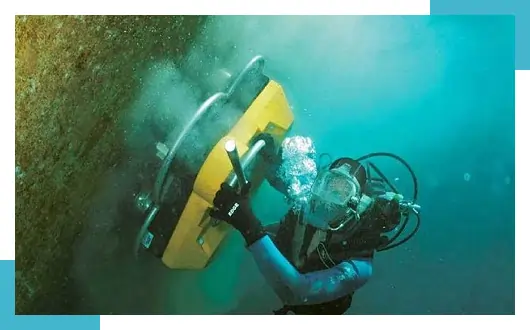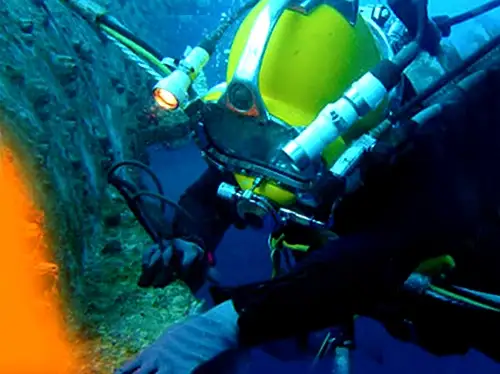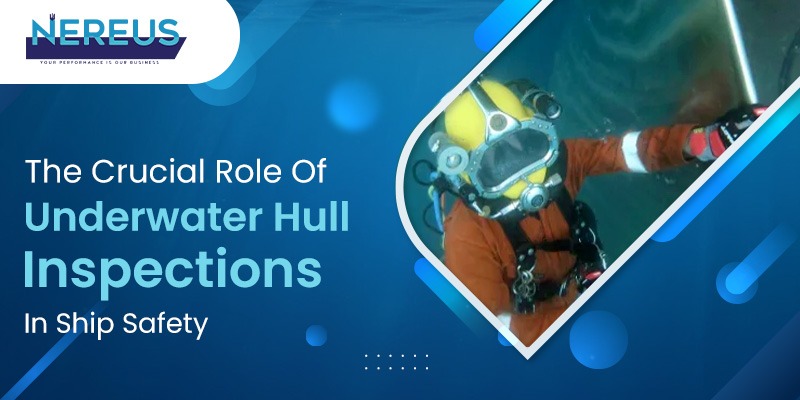Underwater hull inspections are a fundamental aspect of ship safety, allowing for the early detection and mitigation of potential risks and damage, maintaining structural integrity, and optimizing maintenance schedules thereby contributing to the overall safety and operational efficiency of vessels.
There are various methods for conducting underwater hull inspections, including underwater inspection in lieu of dry-docking (UWILD) and the use of remotely operated vehicles (ROVs). By regularly inspecting the hull, areas requiring attention, such as damage or worn-out paint, can be identified and addressed promptly, thus preventing costly damage and maintaining operational efficiency.
The importance of underwater hull inspections is underscored by the need to ensure the safety of the ship and its crew. Regular inspections help prevent potential issues such as water ingress, structural damage, and environmental contamination. Additionally, the use of ROVs and UWILD inspections UAE can significantly reduce the need for dry-docking, saving time and costs while ensuring the safety of the inspection process.
Underwater hull inspections play a pivotal role in maintaining the structural integrity, safety, and environmental sustainability of ships. In this blog, we will explore why these inspections are crucial and how they contribute to the overall safety of maritime operations.
Contact Nereus Subsea for high-quality underwater services in UAE.
1. Protecting Against Corrosion:
The underwater hull of a ship is constantly exposed to harsh marine environments, including saltwater, which accelerates the corrosion process. Corrosion weakens the structural integrity of the hull, making it susceptible to breaches and leaks. Regular underwater inspections enable the detection of corrosion at an early stage, allowing for timely intervention and maintenance to prevent further deterioration.
2. Preventing Biofouling:
Biofouling refers to the accumulation of marine organisms on the hull’s surface. Barnacles, algae, and other marine life can attach themselves to the hull, increasing drag and reducing the ship’s fuel efficiency. Beyond the economic impact, biofouling can also compromise the vessel’s stability. Underwater hull inspections UAE help monitor and address biofouling issues, ensuring that the ship maintains optimal performance and adheres to environmental regulations.
3. Ensuring Compliance with Regulations:
International maritime regulations, such as those set by the International Maritime Organization (IMO), mandate that ships undergo regular inspections to comply with safety and environmental standards. Underwater hull inspections are a fundamental part of this compliance process. Failing to adhere to these regulations not only poses risks to the ship and its crew but may also lead to legal consequences and damage the reputation of the shipping company.
Nereus is one of the best ship maintenance companies in Singapore.
4. Detecting Structural Damage:
The hull is the primary barrier between a ship’s internal spaces and the surrounding water. Any damage to the hull, whether due to collisions, grounding, or wear and tear, can compromise the vessel’s safety. Underwater inspections utilize advanced technologies such as remotely operated vehicles (ROVs) and sonar systems to detect and assess structural damage, allowing for timely repairs and maintenance.
5. Optimizing Dry Docking Schedules:
Dry docking, the process of bringing a ship to a dock for inspection, repair, and maintenance, is a costly and time-consuming endeavour. Regular underwater hull inspections UAE help shipowners optimize dry docking schedules by identifying issues that can be addressed without the need for complete dry docking. This proactive approach minimizes downtime and operational disruptions while ensuring that the ship remains in compliance with safety standards.
Underwater hull inspections are a linchpin in this pursuit, offering a proactive and preventive approach to maintaining the structural integrity of vessels. By protecting against corrosion, preventing biofouling, ensuring regulatory compliance, detecting structural damage, and optimizing dry docking schedules, these inspections contribute significantly to the overall safety, efficiency, and sustainability of the maritime industry.
As technology advances, the capabilities of underwater inspection services UAE will only improve, further enhancing the industry’s ability to safeguard its vessels and the vital global trade they facilitate.

